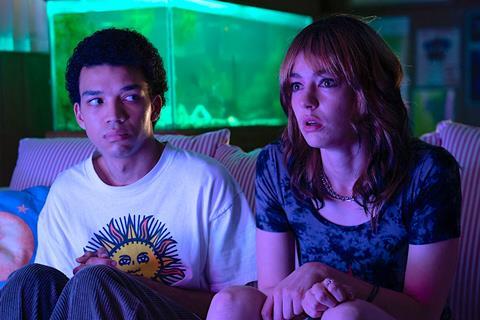A24’s midnight title is a haunting evocation of childhood TV obsessions

Dir/scr: Jane Schoenbrun. US. 2023. 100mins
An increasingly hypnotic experience that touches on identity, loneliness and the television programmes we inexplicably obsess over, I Saw The TV Glow is the latest visually and thematically bold foray from We’re All Going To The World’s Fair writer-director Jane Schoenbrun. Though occasionally strained in its attempt to be a future cult classic, this surreal, unnerving portrait of two teenagers brought together by a powerfully seductive young-adult series has ambition to burn and a riveting sense of style. Justice Smith and Brigette Lundy-Paine fully embrace Schoenbrun’s Lynchian vision, which is uneven but utterly haunting.
The spell that the writer-director slowly weaves is intoxicating
Playing as part of Sundance’s Midnight section before moving on to Panorama at Berlin, the film will open later this year in the US through A24. Arthouse audiences already on Schoenbrun’s trippy, emotional wavelength after World’s Fair will be first in line, and Smith’s rising stardom could also help attract attention. Emma Stone’s production company Fruit Tree is backing I Saw The TV Glow, which will burnish the picture’s hip quotient.
Smith plays Owen, a young misfit who meets Maddy (Brigette Lundy-Paine), a fellow loner. She is a fan of a show called The Pink Opaque, which, judging by its credit sequence, melodramatic tone and fantasy elements, appears to be a cheeky nod to the popular supernatural series Buffy The Vampire Slayer. Mostly spanning the late 1990s to the first decade of the 21st century, I Saw The TV Glow follows Owen and Maddy as they become friends, following the show obsessively ogether. Eventually, though, it gets cancelled and Maddy disappears.
As with World’s Fair, Schoenbrun has created an atmospheric, discombobulating world in which the characters’ connection to one another is fragile but intense. While I Saw The TV Glow pokes fun at ‘90s nostalgia — the Buffy-like Pink Opaque seems rather cheesy — there is also an understanding of how, when people are still impressionable teenagers, the pop culture they consume seeps into the subconscious in a profound way that is impossible to replicate when they are older. The Pink Opaque may not be a great show, but it bonds Owen and Maddy, particularly because the series does not seem to be that popular. The show is theirs, and the more they watch, and the closer they become, the more it seems to convey a hidden truth about them — especially Maddy, who will begin to notice a fraying of the line between reality and fiction.
Early on, I Saw The TV Glow hints at the mind-bending direction that Schoenbrun will eventually go — abrupt time jumps, Owen speaking directly to camera on occasion — and the spell that the writer-director slowly weaves is intoxicating. Their homages to David Lynch — in particular, his ‘90s work — for the most part feel fresh rather than derivative, and the filmmaker is fully confident in the tonal shifts and risky digressions they throw at the audience. I Saw The TV Glow can be ear-shatteringly loud and then stunningly quiet, with Sofi Marshall’s editing expertly intertwining seemingly disparate moods. It would not be fully accurate to describe this picture as horror, but Schoenbrun keeps us off balance, the mysteries of both the TV show and Maddy’s disappearance eventually revealed, but never entirely.
Smith plays the lead role, smoothly navigating Owen’s deeply strange coming-of-age narrative, but he is best when he is alongside Lundy-Paine, whose Maddy gradually reveals the damaged spirit that dwells within her. When they first become friends, Maddy warns Owen that, because she is gay, nothing will happen between them, and yet I Saw The TV Glow is a love story nonetheless. Both seek a sense of belonging, and they find it in one another. And Schoenbrun, who is trans, has said that the film is also about accepting and loving yourself, putting aside the media’s preconceived notions about gender and identity in order to connect with your authentic being.
The film arguably runs too long, risking diminishing the spell’s powerful hold, but as years pass and the characters’ relationship evolves, Schoenbrun returns to the poignant, terrifying notion that although life is not like our favourite television program, it can speak to us sometimes in a way nothing else can, even if we wish that it did not.
Production companies: Fruit Tree, Smudge Films, Hypnic Jerk
International sales: A24, sales@a24films.com
Producers: Sam Intili, Sarah Winshall, Emma Stone, Dave McCary, Ali Herting
Cinematography: Eric K. Yue
Production design: Brandon Tonner-Connolly
Editing: Sofi Marshall
Music: Alex G
Main cast: Justice Smith, Brigette Lundy-Paine, Helena Howard, Lindsey Jordan, Conner O’Malley, Emma Portner, Ian Foreman, Fred Durst, Danielle Deadwyler






















